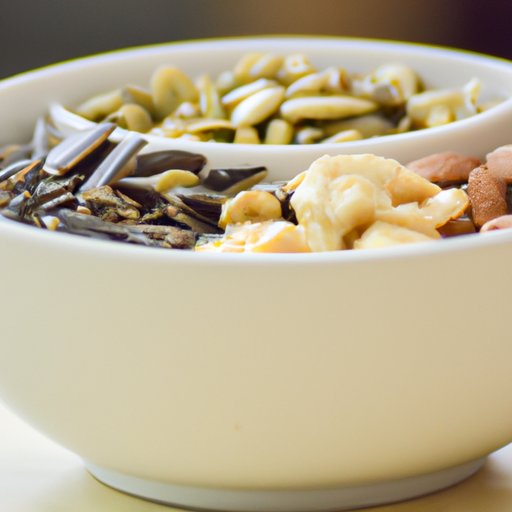Introduction
Protein is an essential macronutrient for our bodies, as it helps build and repair muscles, bones, skin, cartilage, and blood. It also helps us maintain a healthy weight, boosts our energy levels, and strengthens our immune system. Therefore, it’s important to make sure we’re getting enough protein in our diets.
Eating More Eggs
Eggs are one of the best sources of protein, as they contain all nine essential amino acids. One large egg contains 6 grams of protein, as well as vitamins A, E, B12, riboflavin, folate, and choline. Eating eggs can help you feel full longer, which can help with weight management.
To get more protein from eggs, try adding them to your breakfast or lunch. You can add boiled eggs to salads, sandwiches, or wraps. You can also try making omelets, frittatas, or scrambles.

Adding Nuts and Seeds to Your Meals
Nuts and seeds are high in protein, as well as other beneficial nutrients like fiber, healthy fats, vitamins, and minerals. For example, almonds contain 6 grams of protein per ounce, and sunflower seeds contain 5 grams of protein per ounce. Adding nuts and seeds to your meals can help boost your protein intake without adding too many calories.
You can add nuts and seeds to salads, oatmeal, yogurt, smoothies, or homemade trail mix. You can also use nut butters as a spread on toast or as a dip for apples or celery.

Incorporating Tofu Into Your Diet
Tofu is made from soybeans, and it’s an excellent source of plant-based protein. One cup of tofu contains 10 grams of protein, as well as calcium, iron, magnesium, and zinc. It’s also low in calories and saturated fat.
Tofu can be used in a variety of dishes, including stir-fries, soups, salads, curries, and sandwiches. You can also use it as a meat substitute in tacos, burgers, and burritos. To make tofu even more flavorful, try marinating it in your favorite sauces before cooking it.
Eating Lean Meats
Lean meats, such as chicken, turkey, pork, and beef, are excellent sources of protein. Three ounces of cooked lean meat contains about 21 grams of protein, as well as vitamins B6 and B12. Eating lean meats can help you feel fuller for longer and can help with weight management.
To get more protein from lean meats, try adding them to salads, sandwiches, wraps, stews, and casseroles. You can also try making kebabs or skewers with lean meats and vegetables.
Including Dairy Products
Dairy products, such as milk, cheese, and yogurt, are high in protein. One cup of plain Greek yogurt contains 17 grams of protein, while one ounce of cheddar cheese contains 7 grams of protein. Dairy products are also rich in calcium, which is important for bone health.
To get more protein from dairy products, try adding them to your breakfast or lunch. You can add yogurt to smoothies or oatmeal, or use cheese to top salads or sandwiches. You can also try snacking on string cheese or cottage cheese.
Snacking on High-Protein Foods
If you’re looking for a quick and easy way to get more protein in your diet, try snacking on high-protein foods. Some examples include nuts and seeds, hard-boiled eggs, edamame, Greek yogurt, and protein bars. These snacks are convenient and can help keep you full between meals.
When choosing high-protein snacks, opt for ones that are low in sugar and saturated fat. Also, check the ingredient list to make sure the snacks don’t contain any artificial sweeteners or preservatives.
Adding Legumes to Soups and Salads
Legumes, such as beans, peas, and lentils, are high in protein and fiber. They’re also a good source of vitamins, minerals, and antioxidants. One cup of cooked black beans contains 15 grams of protein, and one cup of cooked lentils contains 18 grams of protein.
To get more protein from legumes, try adding them to soups, stews, salads, and casseroles. You can also use them as a side dish or as a base for veggie burgers.
Conclusion
Getting more protein in your diet is important for overall health and wellness. Fortunately, there are many delicious and nutritious ways to do this, such as eating eggs, adding nuts and seeds to your meals, incorporating tofu into your diet, eating lean meats, including dairy products, snacking on high-protein foods, and adding legumes to soups and salads.
For more information on how to get more protein in your diet, consult a registered dietitian or read up on the latest research.
(Note: Is this article not meeting your expectations? Do you have knowledge or insights to share? Unlock new opportunities and expand your reach by joining our authors team. Click Registration to join us and share your expertise with our readers.)
